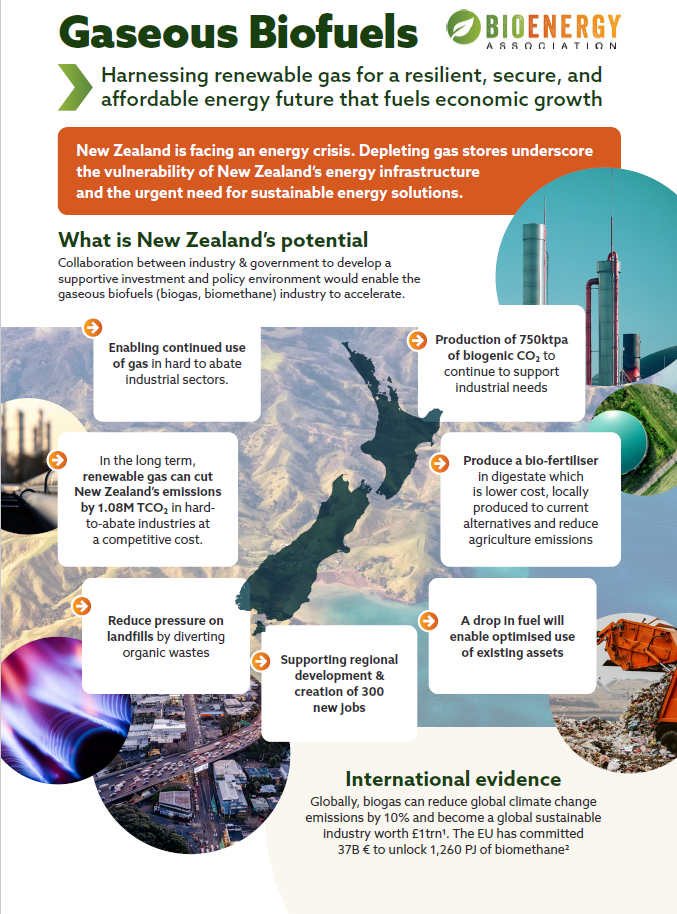Using biogas technologies to reduce methane emissions from waste and facilitating circular economies
Methane is produced from decomposition of organic matter at landfills, waste water treatment facilities and from agricultural production. The methane can be collected and used as biogas for generation of electricity, production of heat or as biomethane - a transport fuel. Methane can be described as carbon dioxide on steroids when its effect as a climate change gas is considered. Methane emissions have at least 25 times the warming potential of CO2 emissions when climate impacts are counted over the longer term. Analysis shows that with adoption of transformation policies such as Zero organic waste to landfills by 2040 New Zealand could reduce 1800 kt CO2-e pa of greenhouse gas emissions by 2050.
Targets for NZ biogas production
The Bioenergy Association’s Gaseous Biofuels Interest Group has set targets of 5PJ by 2027, 12PJ by 2035 and 20PJ by 2050. A strategy for “Harnessing bioenergy renewable gas for a resilient, secure, and affordable energy future that fuels economic growth” can be achieved from these volumes of gaseous biofuels.
Proven technologies
Biogas technologies based around anaerobic digestion are extracting value out of two problems - disposal of waste and climate change due to greenhouse gas emissions. This is a critical foundation of circular economies.
Biogas is a type of bioenergy and increasing our use of bioenergy is good for the economy – providing economic growth through improved land use, businesses and employment, particularly in rural communities. In this website you’ll find the latest information on biogas production and use in New Zealand, Australia and the pacific.
Source: ASB Farmsmarts
Creation of economic value via waste to energy
New Zealand and Australia have a successful, internationally renowned and growing biogas sector, with several consultancies and equipment suppliers implementing projects at home and abroad around waste to energy, supported by a well-informed and skilled research sector. The current estimate of total amount of methane collected and used as biogas in New Zealand is around 50 megawatts (MWe). That's enough energy to power 40,000 households, although most of the current biogas produced is used for heat and electricity in industry-scale applications. There is potential to increase rural biogas generation from food and animal waste. Increased separation of organic material from the waste stream could lead to the development of dedicated bio-reactors.
Biogas is a type of bioenergy derived from organic waste and increasing our use of bioenergy is good for the economy – providing economic growth through improved land use, businesses and employment, particularly in rural communities. Here you’ll find the latest information on waste to energy technologies and biogas production and use in New Zealand.
The biomass and organic waste are co-products of food production, wood and food processing and community living. These are valuable renewable natural resources which can be utilised for the production of valuable biobased products including: bioenergy, biofuels, biochemical, bio-based materials, engineered wood products, compost and assist achieve environmental outcomes including reduction of greenhouse gas emissions, reduction in waste disposal costs, clean waterways, and resilient soils.

